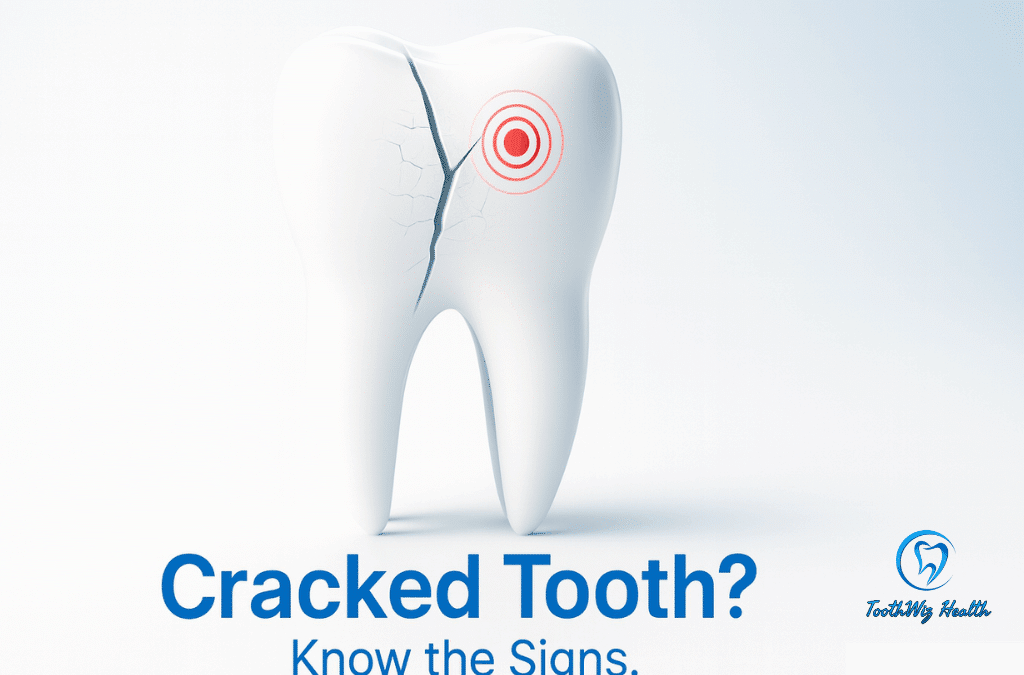
by Dr. Richard J. Walicki | Dec 1, 2025 | Dentistry, Toothache
More people are keeping their natural teeth for life, which is good news for smiles—but it also means we are seeing more teeth develop structural problems over time. Heavy biting forces, large fillings, root canal treatments, and day-to-day stress can all weaken a tooth and set the stage for what dentists call a cracked tooth. In fact, cracked tooth problems are now one of the more common reasons adults report mystery biting pain.
If you are interested in a more technical background, you can also read my earlier article here: Cracked Tooth Information. The article you are reading now is designed as an updated, easy-to-follow guide to help you recognize the signs and understand your options.
Why are cracked tooth problems becoming more common?
Several trends are driving the increase in cracked tooth issues:
- We live longer and keep our teeth longer. Older teeth have been through decades of chewing, temperature changes, and dental work. Large fillings and endodontic treatments remove tooth structure and can leave the remaining tooth more fragile, making a cracked tooth more likely over time.
- Stress, clenching, and grinding are on the rise. Many people clench or grind their teeth when they are focused, anxious, or asleep. Some medications, including certain antidepressants (SSRIs), are associated with increased bruxism, which can amplify these forces and increase the risk of a cracked tooth.
- Substance use can accelerate damage. In patients with a history of methamphetamine or other stimulant use, severe bruxism and dry mouth often combine to produce shortened, worn, and cracked teeth.
- Dentists are simply better at finding cracks. With improved lighting, magnification, and imaging, cracks that once went unnoticed are now diagnosed more often.
Typical cracked tooth symptoms
Cracks do not always behave like a “normal” cavity or toothache. When you have a cracked tooth, the symptoms can seem a bit strange or inconsistent.
- Sharp, brief pain when chewing or biting. Pain often occurs as you bite down or when you release biting pressure.
- Sensitivity to temperature, especially cold. A sip of cold water or air can trigger a quick, sharp twinge.
- Pain that comes and goes. You may go days feeling fine and then suddenly get a streak of discomfort when you chew on a certain area.
- Normal tap test. Tapping with a dental instrument (percussion) may not reproduce the pain, which can make the problem more confusing.
Important: These symptoms are not proof of a cracked tooth. Other conditions, such as inflamed pulp or gum problems around a tooth, can feel very similar. A proper diagnosis always requires a clinical exam.
Why a cracked tooth can be hard to diagnose
From the dentist’s side, crack-related problems can be some of the most challenging cases in everyday practice. Cracked tooth syndrome is known for variable, sometimes vague symptoms and for being difficult to confirm on X-rays.
The “mystery tooth” story
Many patients describe a long history of odd biting pain that is hard to put into words. They may have:
- Episodes of sharp pain when chewing on one side, but not every time.
- Cold sensitivity that comes and goes.
- No obvious pain when the tooth is tapped or pressed.
- Dental X-rays that look normal, or nearly normal.
It is not unusual for someone to see more than one dentist, try different adjustments or restorations, and still have symptoms before a cracked tooth is finally identified. In some cases, a 3-D scan (CBCT), transillumination, or special dyes are needed to make the crack visible. Other times, the true extent of the problem is only discovered after an old filling or crown is removed, or when a narrow, deep periodontal pocket appears along the root.
If you would like to see how a professional organization describes this condition, the American Association of Endodontists has a helpful page on cracked teeth here: Cracked Teeth – AAE.
How serious can a crack become?
Not all cracks are equal. Tiny craze lines in the enamel are extremely common and are usually harmless. Deeper cracks that extend into the dentin, or all the way into the pulp, are more concerning:
- Shallow structural cracks may cause biting sensitivity but can often be stabilized with an onlay or crown.
- Cracks that reach the pulp can inflame or infect the nerve inside the tooth, leading to lingering pain, swelling, or an abscess if bacteria enter.
- Vertical root fractures that extend down the root often have a poor long-term prognosis and may require extraction.
The earlier a significant crack is diagnosed, the more options you usually have to protect and preserve the tooth and avoid losing it altogether.
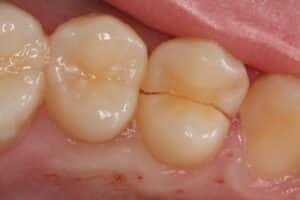
What you can do if you suspect a cracked tooth
If you notice biting pain, temperature sensitivity, or a pattern of “mystery” tooth discomfort that comes and goes, it is worth getting it checked promptly. Here are practical steps you can take if you suspect a cracked tooth:
- Pay attention to patterns. Gently test chewing on one side and then the other. Note whether the pain occurs on biting, on release, or with cold drinks, and share this with your dentist.
- See a dentist sooner rather than later. Waiting for the pain to “settle down” can allow the crack to deepen, sometimes turning a restorable tooth into one that needs extraction.
- Ask what the exam will include. In addition to regular X-rays, your dentist may use magnification, fiber-optic light, special bite tests, or 3-D imaging to look for subtle cracks.
- Discuss all reasonable treatment paths. Depending on the crack’s location and depth, options might range from monitoring and protective bite guards to restorations, or in some cases, referral to an endodontist for further evaluation.
About root canal treatment: When a crack has irritated or infected the pulp, many dentists will recommend root canal therapy as a way to keep the tooth rather than remove it. Whether that makes sense for you depends on the extent of the crack, how the tooth fits into your overall health priorities, and how you feel about this procedure. A thoughtful, individualized discussion with your dentist or endodontist is essential before deciding.
Reducing your risk of future cracks
You cannot control every variable, but you can lower your lifetime risk of a significant cracked tooth with a few practical habits:
- Protect your teeth from excess forces. If you clench or grind, especially at night, ask about a custom nightguard. Address high-stress habits like chewing ice, pens, or very hard foods. The American Dental Association also has a useful overview of bruxism and nightguards here: Bruxism – MouthHealthy.
- Maintain and update older dental work. Very large or aging fillings may need to be replaced with stronger restorations before they fail. Regular checkups make it easier to catch these issues early.
- Support your enamel and overall oral health. A diet that minimizes frequent sugar and acid exposure, along with good daily home care and appropriate professional products, keeps the outer shell of the tooth more resilient. For a deeper dive into enamel repair and protection, see my article on enamel remineralization.
- Think whole-body, not just tooth-by-tooth. Systemic health, medications, sleep quality, and nutrition all influence how your teeth handle stress over time. If you are interested in nutritional and supplemental support for oral and general health, you can learn more on the ToothWiz Vitamins page.
When to seek urgent care
Most cracked tooth problems evolve gradually, but some situations deserve same-day attention:
- Sudden, severe pain after biting on something hard.
- A piece of tooth or filling that breaks off.
- Facial swelling, pimple-like bumps on the gum, or throbbing pain that keeps you up at night.
If any of these occur, treat it as a dental emergency and contact a dentist or urgent care provider as soon as possible.
Bottom line: listen to your teeth
Cracks are not always easy to see or simple to diagnose, and the symptoms can be confusing—even for experienced clinicians. But they are also very real, and catching a cracked tooth early can mean the difference between a conservative restoration and losing the tooth.
If you have unexplained biting pain or temperature sensitivity that just does not feel right, trust your instincts. Get it evaluated, ask questions, and take the time to understand your options so you can choose the path that fits both your mouth and your values.
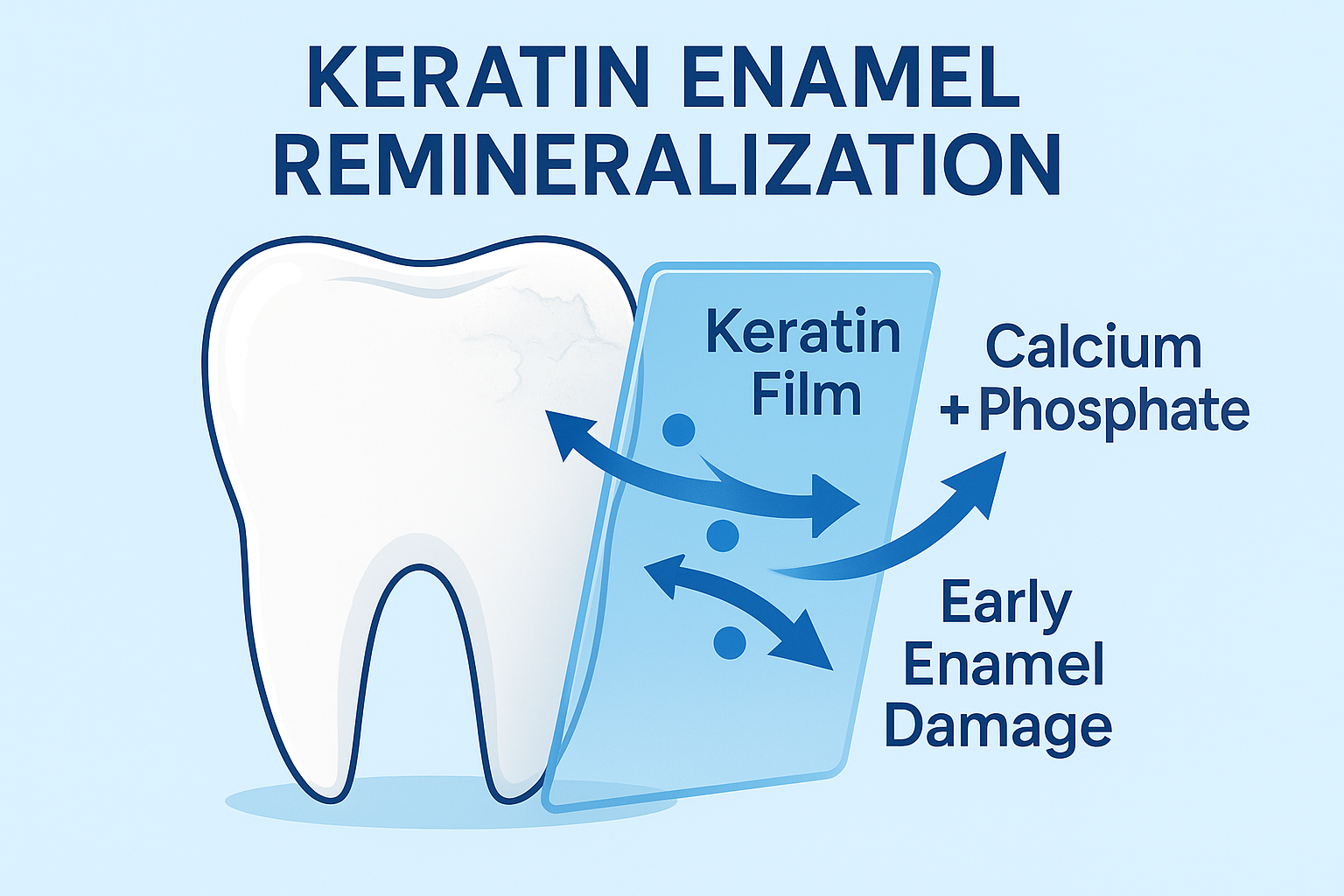
by Dr. Richard J. Walicki | Nov 22, 2025 | Dentistry
Keratin enamel remineralization is an emerging concept that may one day help rebuild early enamel damage using the same protein found in your hair. New research suggests this possibility is much closer than most people realize.
Keratin Enamel Remineralization: A New Direction in Tooth Repair
Tooth enamel is incredibly strong—harder than bone—but it has one major limitation: once its deeper structure breaks down, the body cannot rebuild it. Early enamel erosion often appears as faint, chalky “white spot lesions.” These spots represent weakened enamel where minerals have dissolved away. If this mineral loss continues unchecked, it eventually becomes a cavity.
Traditionally, once enamel reaches a certain level of damage, the only reliable treatment has been to remove the weakened area with a dental drill and restore it with a filling. But modern dental research is shifting toward a different philosophy: repairing enamel at its earliest stages before a cavity forms. This is where keratin enamel remineralization becomes especially interesting.
What “biomimetic” really means
Biomimetic = bio (life) + mimetic (to imitate).
In dentistry, biomimetic methods try to copy the way the body naturally grows or repairs tissues. Instead of patching enamel, the goal is to help the tooth rebuild structures that behave more like the real thing.
Why Keratin Matters
Keratin is the fibrous protein that makes up hair, nails, and the outer layer of skin. When researchers process keratin into thin, water-based films, it forms a delicate network capable of guiding mineral growth. This “support structure,” or scaffold, can help minerals organize in a more natural way.
A recent study published in Advanced Healthcare Materials explored how keratin films behave when exposed to calcium and phosphate ions—the same minerals that create hydroxyapatite, the crystal mineral that gives enamel its hardness. Under microscope analysis, the keratin films provided an orderly framework that encouraged minerals to settle into patterns that closely resemble natural enamel.
Breaking Down the Science in Simple Terms
Healthy enamel is built from tightly packed hydroxyapatite crystals aligned in a very specific pattern. When enamel weakens, these crystals break apart, leaving the surface porous and vulnerable.
The keratin films used in the study acted like a blueprint. Instead of letting minerals clump randomly, the keratin structure guided them to grow in straight, organized layers—much like the original enamel pattern.
Compared to untreated enamel lesions, keratin-supported areas showed:
- stronger structure with greater resistance to wear
- smoother, shinier surfaces
- reduced visibility of white spots
- improved mineral density and uniformity
These improvements suggest that keratin enamel remineralization may enhance natural repair far more effectively than saliva alone.
Study reference: See PubMed summary.
Why This Discovery Matters for Patients
If keratin-based treatments eventually reach dental offices, they may offer a way to repair early enamel damage without drilling. Instead of removing weakened tooth material, dentists might reinforce and rebuild it. This shift could benefit individuals with:
- white spot lesions from early decay
- acid erosion caused by diet, dry mouth, or reflux
- demineralization during orthodontic treatment
- tooth sensitivity from enamel thinning
Keratin enamel remineralization won’t replace fillings, crowns, or traditional treatments—but it may reduce how often patients need them.
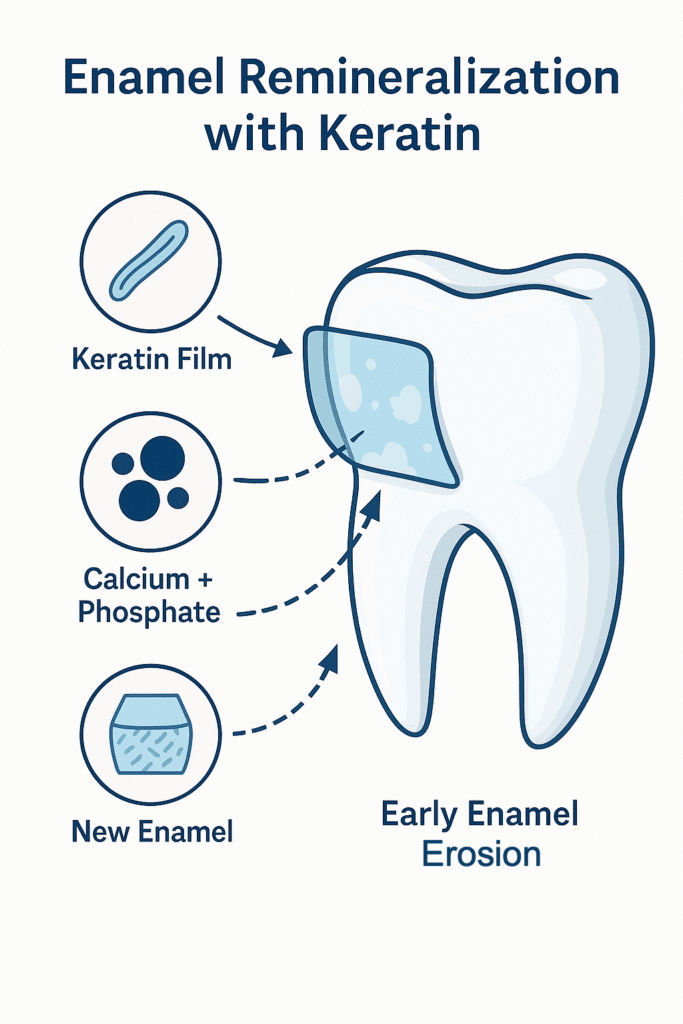
How Keratin Compares to Other Remineralizers
Keratin isn’t the only approach to restoring weakened enamel. Other modern strategies include:
- Nano-hydroxyapatite toothpaste – provides particles similar to natural enamel
- CPP-ACP (casein phosphopeptide–amorphous calcium phosphate) – delivers calcium and phosphate in a stabilized form
- Fluoride therapy – hardens enamel and slows mineral loss
- Saliva enhancement – crucial because saliva naturally protects and repairs enamel
The difference is that keratin helps minerals form in an organized pattern, not just accumulate. That means the regenerated enamel may behave more like the original enamel, increasing its durability.
What Dentists Are Watching Next
Researchers are continuing to study how keratin can be refined, strengthened, and incorporated into clinically usable treatments. Key areas of focus include:
- how to apply keratin films directly to tooth surfaces
- whether keratin can be combined with other minerals for faster results
- how durable keratin-based repairs are under chewing forces
- whether consumers could one day use over-the-counter keratin products
While these questions remain, the direction is clear: dentistry is moving toward regenerative repair rather than mechanical removal.
How You Can Strengthen Enamel Right Now
Even though keratin enamel remineralization is still in development, you can support your enamel today by:
- brushing twice daily with nano-hydroxyapatite toothpaste
- limiting acidic drinks like soda, kombucha, and citrus water
- avoiding frequent snacking, which constantly exposes teeth to acid
- drinking water throughout the day, especially if dry mouth is an issue
- seeing your dentist regularly to catch early enamel changes
If you want to explore additional ways to support enamel and whole-body wellness through nutrition, visit ToothWiz Vitamins. For more unique dental science, see Weird Dental Facts.
Looking Ahead
The idea that a protein known for strengthening hair might help repair enamel is surprising—but it reflects how quickly dental science is evolving. As biomimetic materials continue to advance, the future may involve fewer drills, fewer fillings, and more natural tooth preservation.
For now, the key message is this: early enamel damage doesn’t have to be permanent. With breakthroughs like keratin enamel remineralization on the horizon, we are closer than ever to helping teeth heal themselves.
Flossing Before Brushing: 7 Proven Tips for Healthier Gums
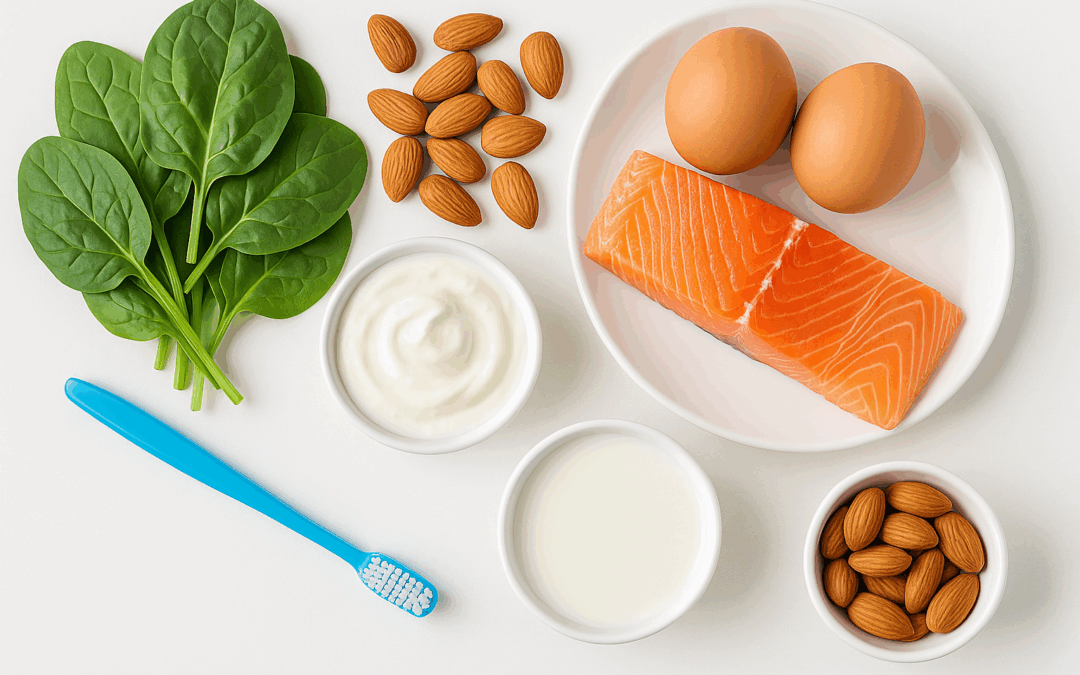
by Dr. Richard J. Walicki | Nov 10, 2025 | Dentistry
Why Enamel Health Matters
Your enamel is the hardest substance in the human body, but it isn’t invincible. Learning how to strengthen enamel naturally can make all the difference between a healthy, pain-free smile and costly dental problems later on. Enamel acts as the first line of defense against bacteria, acid, and wear—yet once it’s damaged, it doesn’t regenerate.
Fortunately, nature gives us plenty of tools to maintain and even restore enamel strength through minerals, diet, and everyday habits. Let’s explore exactly how to keep your enamel resilient for years to come.
Understanding Enamel and Its Role
To know how to strengthen enamel naturally, it helps to understand what enamel actually is. This protective shell is 96% mineral—mostly hydroxyapatite crystals—making it incredibly strong but also prone to erosion if exposed to acid or abrasion over time. Because enamel doesn’t contain living cells, once it’s gone, your body can’t replace it.
Did you know? Enamel erosion can begin without pain or visible signs. By the time sensitivity develops, some mineral loss has already occurred.
That’s why daily habits—like smart nutrition, gentle brushing, and regular hydration—are crucial to protect this natural armor before it weakens.
How to Strengthen Enamel Naturally Through Nutrition
When it comes to dental resilience, your diet is the foundation. Certain nutrients help remineralize enamel and neutralize the acids that cause decay.
1. Eat Calcium- and Phosphorus-Rich Foods
These two minerals are enamel’s building blocks. They repair microscopic damage and strengthen your teeth’s outer surface.
- Dairy Products: Cheese and yogurt help neutralize acid and supply essential minerals.
- Leafy Greens: Spinach, kale, and collards are excellent non-dairy sources of calcium.
- Nuts and Seeds: Almonds and sesame seeds provide minerals and healthy fats.
- Fish: Salmon and sardines with bones add both calcium and phosphorus for enamel repair.
For more on these nutrients, visit the NIH Calcium Fact Sheet.
2. Boost Vitamin D Intake
Vitamin D ensures calcium and phosphorus are absorbed efficiently. Without it, even the healthiest diet won’t help rebuild enamel.
- Spend 10–15 minutes in sunlight each day.
- Include fatty fish such as salmon, tuna, and mackerel.
- Consider a supplement if you live in low-sunlight regions.
Learn more from the NIH Vitamin D Fact Sheet.
Natural Remedies That Protect and Rebuild Enamel
3. Try Oil Pulling and Herbal Rinses
Looking for gentle ways to clean your mouth and strengthen enamel? Herbal rinses and oil pulling can help. Coconut oil pulling, in particular, has been used for centuries to reduce plaque and support gum health.
- Green Tea Rinse: Contains antioxidants that help reduce acid-producing bacteria.
- Coconut Oil: Swish 1 tablespoon for 15–20 minutes daily to minimize plaque buildup.
- Sage or Mint Rinse: Naturally antibacterial and refreshing.
Tip: Replace commercial mouthwashes containing alcohol with herbal or oil-based alternatives to preserve healthy enamel flora.
4. Stay Hydrated to Support Natural Remineralization
Water is your mouth’s natural defense system. It helps produce saliva, which neutralizes acids and carries minerals that rebuild enamel. Without adequate hydration, the mouth becomes dry, acidic, and prone to decay.
- Drink at least eight glasses of water daily.
- Rinse after acidic foods instead of brushing immediately.
- Chew sugar-free gum to stimulate saliva flow.
How Long It Takes to Strengthen Enamel Naturally
Many people ask how long it actually takes to see results from natural enamel care. While everyone’s mouth chemistry is different, small improvements can begin within a few weeks of consistent effort. Visible results—like reduced sensitivity or smoother tooth surfaces—typically appear after one to three months of disciplined care.
Reminder: Strengthening enamel is a long-term process. Think of it like fitness for your teeth—results build over time.
Common Mistakes That Weaken Enamel
- Brushing Too Hard: Aggressive brushing erodes enamel. Use a soft-bristled brush and gentle pressure.
- Frequent Snacking: Constant acid exposure prevents saliva from restoring minerals.
- Overusing Whitening Products: Many whitening agents are abrasive and can thin enamel over time.
- Ignoring Dry Mouth: Saliva protects enamel—address dryness caused by medications or dehydration.
Conclusion: How to Strengthen Enamel Naturally for Life
Now that you understand how to strengthen enamel naturally, you can take daily steps to protect your teeth for life. Choose nutrient-rich foods, stay hydrated, manage stress, and visit your dentist regularly. With time and consistency, these habits can rebuild mineral density, reduce sensitivity, and give you a brighter, more confident smile.
With consistent habits and mindful care, anyone can learn how to strengthen enamel naturally and maintain a healthy, radiant smile for years to come.
Final Thought: You only get one set of enamel—treat it like the precious shield it is. Small daily actions truly add up to lasting oral health.
how to strengthen enamel naturally, strengthen enamel naturally, natural enamel strengthening, enamel protection, enamel care, remineralize teeth naturally, protect tooth enamel naturally, tooth enamel health, how to rebuild enamel naturally
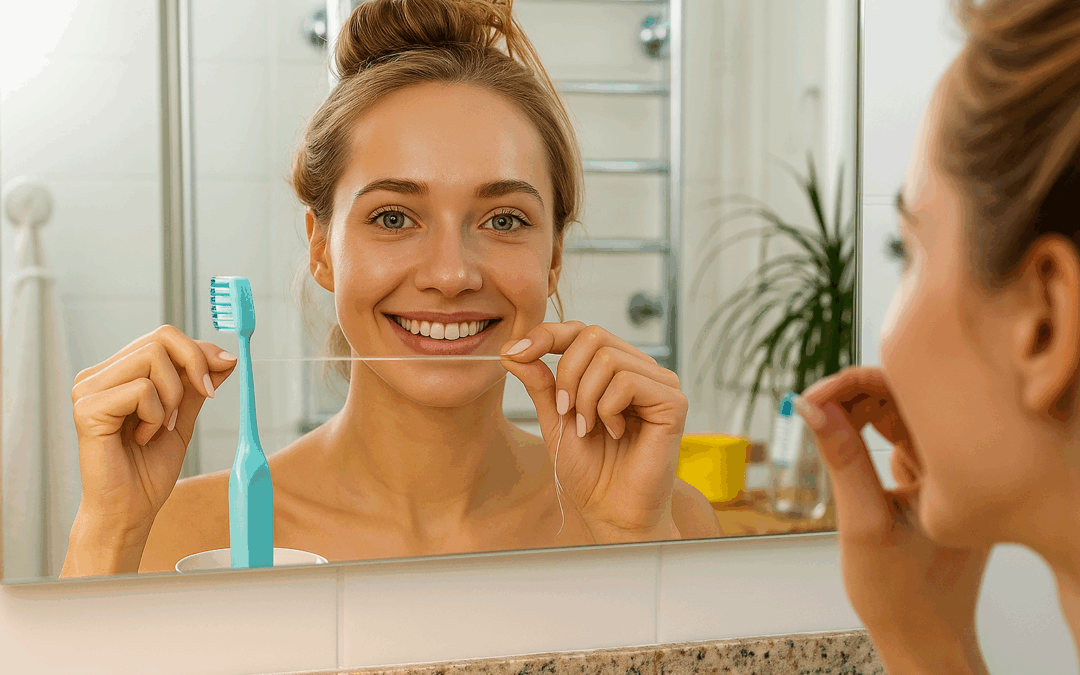
by Dr. Richard J. Walicki | Nov 2, 2025 | Dentistry, Prevention
Most people know they should brush twice a day, but many still wonder when to floss, how often to do it, and whether it really makes a difference. The truth? Flossing before brushing is every bit as important as brushing itself — and consistency matters more than perfection.
1. Flossing Before Brushing: Do This First
When it comes to flossing before brushing, the sequence truly matters. Flossing first helps loosen food particles, plaque, and bacteria from between teeth and under the gumline. Once those areas are cleared, brushing becomes more effective at sweeping away debris and polishing tooth surfaces.
Think of it like prepping before you paint: you wouldn’t apply a fresh coat until you’ve cleaned the surface underneath. That’s why dentists often recommend flossing first as part of your daily routine.
For timing details, see this article on the best time to brush.
2. Floss Daily — Consistency Beats Frequency
Floss at least once a day — every day. Doing it sporadically doesn’t yield noticeable results. Just as you wouldn’t expect fitness results from exercising once in a while, you can’t expect gum health from flossing only when you remember.
Regular, daily flossing makes a tangible difference. And if you enjoy flossing after meals? Even better. The patients I’ve seen who flossed after every meal consistently had the healthiest gums and the fewest dental issues.
3. Brush Twice a Day — or After Meals When You Can
Most experts agree on brushing twice a day — morning and night — but if you can manage to brush after meals, that’s ideal. Realistically, not everyone can, but try to at least rinse with water after eating if brushing isn’t possible.
Learn more about brushing habits at the American Dental Association.
4. Choose String Floss Whenever Possible
Traditional string floss gives you the best control for wrapping around each tooth and cleaning below the gumline. However, I’d rather see you use floss picks than skip flossing entirely. Some floss picks even use more sustainable or gentle materials — just make sure to avoid floss containing “forever chemicals” (PFAS), which have raised health concerns (NIH source).
5. Master the Proper Flossing Technique
Flossing isn’t just about getting between the teeth — it’s about how you do it. This simple technique helps you get the most benefit:
- Measure about 18 inches of floss. Wrap most of it around your middle fingers, leaving about two inches between your hands.
- Hold the floss taut between your thumbs and forefingers for control.
- Gently guide the floss between two teeth — avoid snapping it down, which can cause “floss cuts.” Start gently to prevent accidental cuts, especially if your gums are still unhealthy.
- Curve the floss into a “C” shape around each tooth, sliding it carefully under the gumline.
- Move up and down along the tooth’s surface to remove plaque and debris.
- Use a clean section of floss for each tooth.
6. Expect Bleeding at First — Then Watch It Stop
Many people get freaked out the first time they notice their gums bleeding after flossing and assume the floss is causing the problem. In reality, healthy gums don’t bleed. The bleeding happens because the gums are inflamed — a sign they need more attention, not less. This is one of the main reasons why flossing before brushing can make such a visible difference: it reaches where your toothbrush can’t.
As you make flossing part of your daily routine, you’ll likely notice less and less bleeding each day. Within one to two weeks, most people see a dramatic improvement.
7. Start After a Professional Cleaning for Best Results
If you have heavy or sub-gingival tartar, it’s important to start your routine after a professional cleaning or scaling and root planing (SRP). No matter how diligently you brush, you can’t remove hardened deposits yourself. Once the area is cleaned, flossing before brushing becomes far more effective — and you’ll notice healthier gums within about two weeks.
Bottom Line
Floss first, brush regularly, and stay consistent. Make flossing before brushing your daily habit. Small daily routines lead to lasting results — in dental health, just like exercise, the payoff comes from showing up every day.
For more on maintaining healthy teeth and gums naturally, check out this guide on oral health and nutrient deficiencies.
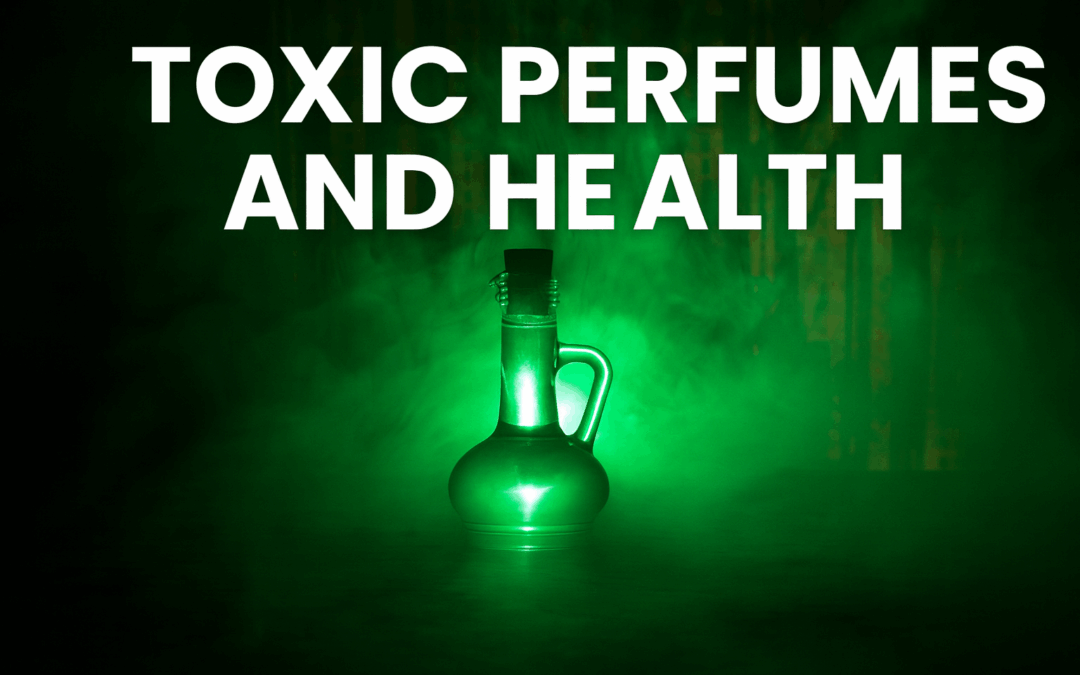
by Dr. Richard J. Walicki | Oct 27, 2025 | Chemicals and toxins, General Health
The Hidden Dangers of Toxic Perfumes and Health Risks from Everyday Scents
When it comes to toxic perfumes and health, most people never realize how much exposure they have. Walk into almost any store today, and you’re surrounded by fragrance. The air smells like “fresh linen,” “spring rain,” or “mountain breeze.” Even products that don’t need scent — like tissues, detergents, or trash bags — are infused with fragrance chemicals. The question is: what are you really breathing in or rubbing onto your skin?
Many people think of perfume as a luxury — a personal signature that enhances attractiveness or confidence. But behind that enticing scent may lie a mix of industrial chemicals, many derived from petroleum, the same source used to make gasoline and plastics. These substances may contribute to a toxic burden that your body must process, potentially accelerating the very aging processes you’re trying to slow down.
The Shocking Reality: Perfume Ingredients Come from Petroleum
The perfume industry is a multibillion-dollar enterprise, and the cost of raw materials is startlingly low. While some boutique brands use natural essential oils, the vast majority of mainstream perfumes rely on synthetic aromatic compounds derived from petroleum. These chemicals can cost just a few dollars per barrel to produce — yet end up in bottles that sell for $100 or more.
To make things worse, manufacturers are not required to disclose every ingredient on the label. Fragrance formulas are legally protected as “trade secrets,” meaning that hundreds of potential chemicals can be hidden under a single word: “fragrance.”
According to the Environmental Working Group (EWG), fragrance chemicals can contain hundreds of unlisted ingredients, some of which are linked to allergies and hormone disruption. Meanwhile, NIH research has shown that many of these compounds act as endocrine disruptors and oxidative stressors within the body.
Common synthetic fragrance ingredients include:
- Phthalates – used to make scents last longer, but linked to endocrine disruption and reproductive issues.
- Musk ketones – persistent environmental pollutants that accumulate in human tissue.
- Benzene derivatives and aldehydes – associated with headaches, dizziness, and skin irritation.
- Toluene – a solvent known to cause liver and kidney damage in high doses.
When you spritz perfume onto your skin or hair, or inhale it from the air, these compounds don’t just disappear. Your body has to deal with them — just as it would if you had eaten them. That’s where the connection between toxic perfumes and health becomes clear: what you wear, you also absorb.
“If You Put It On, You’re Eating It”
The skin is your largest organ, and it’s permeable. That means that lotions, soaps, and sprays applied to your skin are absorbed into the bloodstream. Dermatologists and toxicologists alike recognize that “what goes on you goes in you.”
The same holds true for airborne exposure. Every time you inhale a fragrance, tiny chemical particles travel into your lungs, enter the bloodstream, and must be metabolized or excreted by your body. The lotion on your hands, the shampoo in your hair, the laundry detergent on your clothes — all of these can be sources of constant, low-level chemical exposure. It’s like eating tiny doses of perfume every day without realizing it.
The Toxic Load and Its Impact on Aging
Your liver, kidneys, and lungs are the primary detoxifying organs, constantly processing what enters your body. When the load of synthetic chemicals becomes too high, these systems can become overburdened. The result? Inflammation, oxidative stress, and cellular damage — all of which are closely tied to premature aging.
Chronic exposure to toxic perfumes and health-disrupting compounds can accelerate oxidative damage, disrupt hormones, and place additional strain on the body’s detox pathways.
Research in environmental medicine increasingly links chronic exposure to synthetic chemicals with issues such as:
- Hormonal imbalance
- Fatigue and brain fog
- Skin irritation and accelerated wrinkling
- Respiratory irritation or asthma
- Headaches and migraines
- Increased oxidative stress and cellular damage
In other words, slathering on scented lotions or spraying perfume may smell glamorous — but it’s not doing your cells any favors. For those focused on anti-aging and longevity, reducing your daily toxic perfumes and health burden is one of the smartest lifestyle moves you can make.

Fragrance Pollution Is Everywhere
The problem extends far beyond perfume bottles. Almost everything on supermarket shelves today is scented:
- Shampoos, conditioners, and soaps
- Body lotions and deodorants
- Air fresheners and candles
- Laundry detergents, dryer sheets, and cleaning products
- Even clothing and packaging materials
The connection between toxic perfumes and health isn’t limited to perfume bottles — it extends to everything we breathe and touch. When a product smells “fresh,” that usually means synthetic fragrance compounds were added — not that it’s clean. In enclosed environments like homes, offices, or cars, these volatile compounds (VOCs) circulate in the air and cling to fabrics, walls, and skin.
Ever noticed how one heavily perfumed person can “fill the room”? That’s because fragrance molecules are designed to linger and spread. Once airborne, they mix with other chemicals and fine particles, forming secondary pollutants — which you and everyone else then inhale.
A Real-Life Example: When “Fresh” Became Overpowering
Several years ago, my wife and I spent Thanksgiving with a close friend whose brother—a physician—owned a beautiful home in North Carolina with a separate guest house. The moment we stepped inside, we were hit with an overwhelming wave of artificial “freshness.” It was so strong that we could hardly breathe. Within minutes, both of us developed headaches, and I joked to my wife that someone must be trying to hide a corpse because the air smelled that unnatural.
Determined to find the source, I started looking around and discovered one plug-in air freshener after another. I pulled out the first, but the smell didn’t fade. Then another. And another. If memory serves, there were at least eight—possibly ten—scattered throughout the house. Even opening the windows in November barely helped. It was a perfect illustration of how “fragrance” can transform from a pleasant accent into an assault on the senses.
Experiences like that bring home the reality of toxic perfumes and health concerns. What we often think of as clean or inviting can actually fill the air with synthetic chemicals that irritate the lungs, trigger headaches, and overload the body’s detox systems. That evening left a lasting impression on both of us—and a firm commitment to keep our own home fragrance-free.
The Aisle-Five Effect
Here’s a vivid way to picture it: imagine a supermarket with perfume or detergent on aisle five and fresh bread on aisle six. The air in that store is shared. Those perfume vapors don’t politely stay in their lane — they drift, and the bread (a porous food) absorbs airborne particles. So even the “unscented” areas aren’t truly fragrance-free.
Now multiply that by every scented household item you own — from “ocean breeze” trash bags to “lavender fresh” dryer sheets — and you start to see how pervasive the issue is. You’re not just smelling it; you’re living in it.
The Problem with “Fragrance-Free” and “Natural” Labels
You might think you’re safe if you buy “fragrance-free” or “unscented” products, but marketing can be deceiving. Some “fragrance-free” products still use masking fragrances to neutralize other smells. Likewise, “natural” doesn’t always mean non-toxic — a product may still contain synthetic fragrance components alongside natural oils.
To identify truly safe options:
- Look for “no synthetic fragrance” on the label.
- Choose products scented only with pure essential oils (and even then, check purity).
- Use unscented detergents and non-toxic cleaning products certified by third-party programs like EWG Verified or Made Safe.
- Avoid plug-in air fresheners and aerosol sprays. Instead, use natural alternatives like open windows, houseplants, or essential oil diffusers.
The Better Smell of Clean Living
Eliminating artificial fragrances doesn’t mean living in a scentless world. Natural alternatives like essential oils — when used safely and sparingly — can add pleasant aromas without the chemical burden. Scents like lavender, citrus, eucalyptus, or peppermint can even have health benefits when diffused or used topically with proper dilution.
Reducing your exposure to toxic perfumes and health stressors gives your body room to regenerate and perform its natural detox processes. However, moderation is key. Even natural substances can cause irritation or allergies in sensitive individuals. The goal is to let your home, skin, and body breathe freely — not to replace one form of chemical overload with another.
A Step Toward Anti-Aging and Total Health
If your goal is longevity, cellular vitality, or slowing the visible signs of aging, reducing your exposure to environmental toxins is crucial. That includes what you breathe, apply, and live among every day.
Just as you might choose clean, nutrient-rich foods to nourish your body, you can choose clean, non-toxic personal care and home products to protect it. Every small choice adds up to less internal stress — and that means fewer free radicals, less inflammation, and a body that ages more gracefully.
For a deeper look at reducing toxin exposure and supporting detox pathways, visit ToothWiz Vitamins for curated wellness products that complement your clean-living lifestyle.
The Bottom Line
The next time you reach for that bottle of “floral fantasy” perfume, remember: it’s not just perfume. It’s a chemical cocktail that your skin absorbs, your lungs inhale, and your liver has to process. The link between toxic perfumes and health outcomes is undeniable. If you wouldn’t eat it, maybe you shouldn’t wear it.
Frequently Asked Questions
Can wearing perfume really affect my oral or respiratory health?
Yes. While perfume is applied to the skin, the vapors are inhaled continuously. Synthetic fragrance molecules can irritate mucous membranes, including those in the mouth, sinuses, and lungs—especially in enclosed spaces. Over time, that exposure can contribute to inflammation or sensitivity in airways.
What are safer alternatives to synthetic perfumes?
Choose natural, essential-oil–based fragrances labeled “no synthetic fragrance.” Even better, opt for minimal or fragrance-free products in detergents, body lotions, and hair care. They reduce cumulative exposure and support overall oral and systemic wellness.











